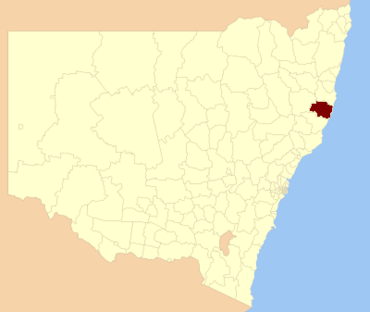Port Macquarie-Hastings Council facts for kids
Quick facts for kids Port Macquarie-HastingsNew South Wales |
|||||||||||||||
|---|---|---|---|---|---|---|---|---|---|---|---|---|---|---|---|

Location in New South Wales
|
|||||||||||||||
| Population |
|
||||||||||||||
| • Density | 23.5376/km2 (60.962/sq mi) | ||||||||||||||
| Established |
|
||||||||||||||
| Area | 3,686.1 km2 (1,423.2 sq mi) | ||||||||||||||
| Mayor | Peta Pinson (National) | ||||||||||||||
| Council seat | Port Macquarie | ||||||||||||||
| Region | Mid North Coast | ||||||||||||||
| State electorate(s) |
|
||||||||||||||
| Federal Division(s) | |||||||||||||||
 |
|||||||||||||||
| Website | Port Macquarie-Hastings | ||||||||||||||
|
|||||||||||||||
The Port Macquarie-Hastings Council is a local government area in New South Wales, Australia. It's located on the Mid North Coast of the state.
This area is close to the Hastings River and major roads like the Pacific Highway and Oxley Highway. It also has the North Coast railway line running through it. Some of the main towns and areas here include Port Macquarie, Camden Haven, Wauchope, Lake Cathie, and Kendall.
The person in charge of the Port Macquarie-Hastings Council is the mayor. Since August 4, 2017, the mayor has been Peta Pinson. She was an independent politician but joined the Nationals in 2023.
Contents
Exploring Port Macquarie's Suburbs
Port Macquarie has many different areas, or suburbs. These are parts of the larger Port Macquarie-Hastings region.
- Blackmans Point
- Port Macquarie CBD (This is the main business area, not a suburb itself)
- Fernbank Creek
- Flynns Beach
- Innes View
- Lake Innes
- Limeburners Creek
- North Shore
- Port Macquarie
- Port Macquarie West
- Sancrox
- Sovereign Hills
- Tacking Point
- The Hatch
- Thrumster
Towns and Localities in the Area
The Port Macquarie-Hastings Council area includes many towns and smaller places. These are all the communities that the council helps to manage.
- Port Macquarie (This is where the main council office is)
- Bagnoo
- Bago
- Ballengarra
- Banda Banda
- Batar
- Beechwood
- Bellangry
- Birdwood
- Black Creek
- Blackmans Point
- Bobs Creek
- Bonny Hills
- Boorganna
- Bril Bril
- Brombin
- Byabarra
- Camden Haven
- Camden Head
- Comboyne
- Cooperabung (part)
- Crosslands
- Deauville
- Debenham
- Diamond Head
- Dondingalong (part)
- Doyles River
- Dunbogan
- Ellenborough
- Fernbank Creek
- Forbes River
- Frazers Creek
- Gearys Flat
- Grants Beach
- Gum Scrub
- Hacks Ferry
- Hartys Plains
- Herons Creek
- Hollisdale
- Huntingdon
- Hyndmans Creek
- Innes View
- Jolly Nose
- Kendall
- Kerewong
- Kew
- Kindee
- Kings Creek
- Kippara
- Lake Cathie
- Lake Innes
- Laurieton
- Limeburners Creek
- Logans Crossing
- Long Flat
- Lorne
- Lower Pappinbarra
- Marlo Merrican
- Middle Brother
- Mortons Creek
- Mount Seaview
- North Brother
- North Haven
- North Shore
- Pappinbarra
- Pembrooke
- Pipeclay
- Port Macquarie
- Rawdon Island
- Redbank
- Riverside
- Rollands Plains
- Rosewood
- Rossglen
- Sancrox
- Swans Crossing
- Telegraph Point
- The Hatch
- Thrumster
- Toms Creek
- Upper Pappinbarra
- Upper Rollands Plains
- Upsalls Creek
- Wauchope
- Werrikimbe
- West Haven
- Yarras
- Yippin Creek
Who Lives in Port Macquarie-Hastings?
Let's look at the people who live in the Port Macquarie-Hastings area. This information comes from the 2021 Census.
There were about 86,762 people living here. Slightly more than half (52.1%) were female, and 47.9% were male. About 5.5% of the population were Aboriginal and Torres Strait Islander people.
The average age of people in this area was 49 years old. This is a bit older than the national average for Australia. About 15.9% of the population were children aged 0 to 14 years. People aged 65 and over made up a larger part of the population, at 29.1%.
Most people in the area speak English at home (93.7%). This is much higher than the national average. About 64% of residents identify with Christianity.
How the Council Works
The Port Macquarie-Hastings Council is made up of nine people called councillors. One of these councillors is the mayor. They are elected for a four-year term.
The mayor is chosen directly by the people who live in the area. The other eight councillors are elected using a system that makes sure different groups are represented.
In 2017, the mayor at the time, Peter Besseling, resigned. Lisa Intemann, who was the Deputy Mayor, took over for a short time. Then, a special election was held, and Peta Pinson became the new mayor.
The council elected in 2021 includes:
| Councillor | Party | Notes | |
|---|---|---|---|
| Peta Pinson | Team Pinson | Mayor | |
| Adam Roberts | Team Pinson | ||
| Danielle Maltman | Team Pinson | ||
| Josh Slade | Team Pinson | ||
| Sharon Griffiths | Team Pinson | ||
| Lauren Edwards | The Greens | ||
| Lisa Intemann | Fighters For Our Region | Elected 2012, 1995–2008, Acting Mayor May–August 2017 | |
| Nik Lipovac | Hastings First | ||
| Rachel Sheppard | The Sheppard Team for Sensible, Sustainable Progress | ||
A Brief History of Local Government
Local government in the Hastings region has a long history. It started way back in 1842 with a law that allowed for local councils.
In 1843, the Macquarie District Council was created. It was one of the first 28 councils in New South Wales. However, these early councils didn't work very well.
Later, in 1858, a new law made it easier for towns to form their own councils. The people of Port Macquarie tried twice to form a council, in 1859 and 1867, but it didn't happen. Finally, on March 15, 1887, the Port Macquarie Municipal District was officially formed. James McInherney became its first mayor.
In 1906, the Shire of Hastings was created, based in the town of Wauchope. Its first leader was James O'Neill.
In 1981, these two councils, Port Macquarie and Hastings, joined together. They formed the Municipality of Hastings. Norm Matesich was the first mayor of this new combined council.
In 1991, the council moved into its current building in Port Macquarie. In 2005, the name was changed to Port Macquarie-Hastings Council. This new name was chosen after a community survey, as people felt it better represented the whole area.

